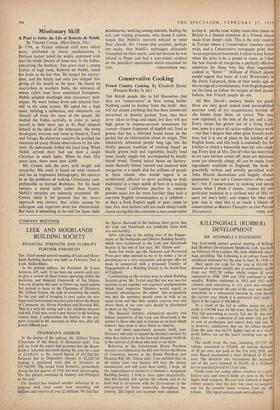Conservative Cooking
THE British people like to kid themselves that they are 'conservative' in their eating habits. Nothing could be further from the truth : they will eat almost anything that has been intensively advertised or daintily packed. True, they have never taken to frogs and snails, but they will pay high prices in expense-account restaurants for scampi—frozen fragments of dogfish tail, fried in grease that has a televised brand name on the packet but no information about its origin. This intensively urbanised people long ago lost the thrifty peasant tradition of cooking based on locally grown fruit and vegetables, locally bred meat, locally caught fish, accompanied by locally baked bread. Tinned baked beans on factory- made flannelly bread, toasted and smeared with margarine, is a staple dish for millions of people in these islands who would regard it as monstrously affected to serve anything so truly traditional as a roast saddle of hare or a sucking pig. Tinned Californian peaches in custard- powder sauce are far more familiar than such a one-time English commonplace as a syllabub— or than a fresh English apple or pear, come to that. Our own farmers will not make sheep's-milk cheese saying that the consumer is too conservative to buy it : yet the most widely eaten blue cheese in Britain is a Danish imitation of a French cheese made from sheep's milk. This is the only country in Europe where a Conservative countess could write, and a Conservative newspaper print, that 'as an experienced housewife I refuse to buy butter when the price is 6s. a pound or more, as I' find the best brands of margarine a perfectly effective substitute for those who like their vegetables cooked in "butter."' Millions of French people would regard that letter of Lady Winterton's to the Daily Telegraph, three or four weeks ago, as the ravings of a revolutionary. Few English people eat the food, or follow the recipes, of their grand- fathers; few French people do not.
All Mrs. David's cookery books are good; three are very good indeed (one accomplished amateur cook of my acquaintance learned all she knows from them, ab initio). This one, now reprinted, is the best of the lot, and a joy. Every recipe has grown out of a living tradi- tion, none is a piece of cuisine raffinge fancy-work —not that I despise that other great French tradi- tion, but it is out of place in the kitchen of an English home, and this book is essentially for the kitchen in which a housewife does her own cook- ing. Every dish of Mrs. David's that has been tried in my own kitchen comes off; Most are delicious; some are absurdly cheap; all can be made from ingredients available in England; the book is gracefully written and prettily garnished with John Minton decorations and happily chosen quotations. I am not a Conservative—who could be?—but if conservatism in cooking and eating means what I think it means : respect for one particular tradition in a civilised way of life; re spect for one's belly; and respect for what one puts into it, then this is as much a classic of conservatism as Burke's Thoughts on Our Present


































 Previous page
Previous page